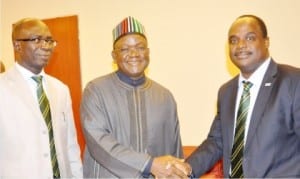Business
Crisis Looms In Oil Community …As Youth Body Parades Two Excos

Governor Samuel Ortom of Benue State (middle), welcoming the Managing Director, Bank of Agriculture (BOA), Prof. Danbala Danju, during a meeting with Executives of BOA in Abuja on Thursday. With them is the BOA Executive Director, Wholesale Finance, Mr Babatunde Igun.
Controversy is trailing the recent election conducted by the Egi Oil and Gas Producing Families Youth Association (EOGPFYA) in Ogba/Egbema/Ndoni Local Government Area of Rivers State as two separate executive committees have emerged.
The Tide gathred that the Election Committee (ELECO) put in place by the out-going Executive Committee split into two with each faction led by the Chairman, Mr. Anthony Agileba and the other by the Secretary, Uzoma Ukpaka, conducted separate elections which in turn produced two new parallel executive Committees.
A candidate for the office of President, Mr. Nakad Innocent Okwu alleged that contrary to the constitutional provision for specific date, time and venue of election to be indicated in the election guideline and time-table, these were completely absent.
The aspirant said both the Chairman, Mr. Agilebu and Secretary, Ukpaka worked at cross roads, with each having his own delegates list and also conducting parallel elections same day but at different venues.
“While ELECO Chairman conducted his at the SAR’s office at Erema, his Secretary, Uzoma Ukpaka conducted his own at Obite”, he said, adding that delegates lists were duplicated by the two, thereby making impossible for a free, fair and transparent election to be conducted.
According to Okwu, unknown delegates were forced to queue behind Prince obodo who was later paraded as Chairman by the ELECO.
He rejected the result of the election because of the alleged electoral malpractices and called on the leaders of Egi, the government and all peace-loving individuals to intervene and nip in the bud the impending danger looming over the issue.
However, in a release signed by the ELECO Chairman, Agilebu Anthony dated 14th August 2015, Obodo Prince C was announced the Executive President. He was to lead a 16-member executive that would pilot the affairs of the body for three years.
Affirming the result, the Chairman, Board of Trustees (BOT) Egi Oil and Gas Producing Families Youth Association, Hon. Roland Ajie, said the winner of the association’s general elections held on the 14th of August 2015at SARs Barrack, Erema, was Obodo prince.
The BOT Chairman urged Total E7P Nigeria Limited, government agencies as well as members of the general public to deal only with the said executive.
A release from the board and signed by the Chairman threatened that any transaction in the name of the youth body outside the Prince Obodo-led executive does not get the recognition or acceptance of the board or the association.
The Tide gathered that other contestants were also seeking for their recognition or total cancellation of the election, especially by Total Oil Company.
The fear is that if the confusion is not resolved peacefully and on time the youth election is capable of obstructing the relationship between the body and the oil firm which might in turn degenerate to crisis in the oil-rich Egi clan.
Chris Oluho
Transport
Automated Points Concession : FAAN Workers Gave 72hrs To Revise Decisions In PH

Transport
FAAN Announces Pick-Up Points for Go-Cashless Cards

Business
Fidelity Bank To Empower Women With Sustainable Entrepreneurship Skills, HAP2.0
-
Politics3 days ago
2027: NIGERIANS FAULT INEC ON DIGITAL MEMBERSHIP REGISTER DIRECTIVE
-

 Environment3 days ago
Environment3 days agoLAWMA Director Says Sweeping Reforms Have Improved Waste Collection
-
Politics3 days ago
LP Crisis: Ex-NWC Member Dumps Dumps Abure Faction
-

 Politics3 days ago
Politics3 days agoUmahi Dismisses Allegations On Social Media, Insists On Projects Delivery
-

 Sports3 days ago
Sports3 days agoAbia Not Sure To Secure continental Ticket
-
Sports3 days ago
La Liga: Yamal Records First Career Hat-trick
-

 Sports3 days ago
Sports3 days agoCity Survive Leeds’ Challenge At Elland Road
-
Politics3 days ago
NATASHA ELECTRIC VEHICLES INITIATIVE IN KOGI CENTRAL

